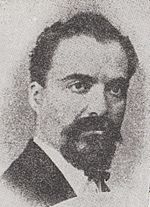About Vasile Burlă
- Vasile Burla (February 9, 1840–January 9, 1905) was an Imperial Austrian-born Romanian philologist. Born in Opai?eni, a village in the Duchy of Bukovina that today is part of Ukraine, he attended primary school in nearby Storojine?.
- He then went to the gymnasium in the provincial capital Czernowitz (Cernau?i), taking his degree at Beiu? in Cri?ana.
- He attended the universities of Vienna and Graz, graduating in Greek and Latin philology.
- In 1873, he settled at Ia?i, in the Romanian Old Kingdom, and was named teacher of Greek and Latin at the National College.
- He taught at the school for many years, and was director for a period.
- His students included Nicolae Iorga and Mihail Sadoveanu.
- In 1925, on the 20th anniversary of his death, his former students dedicated a bronze bust in front of the school.
- From 1880 to 1890, he taught at a girls' high school, and from 1898 to 1901 taught classics at the Boarding High School.
- From 1875 to 1876, he was substitute professor at Ia?i University.
- Late in life, he was a school inspector.
- Burla had to retire in 1901; he died four years later, and was buried at Eternitatea cemetery.
- His textbooks include Gramatica limbei grece?ti clasice (1873), Carte de exerci?ii latine (1888) and Gramatica limbei grece?ti, prelucrare dupa Curtius (1895).Burla joined Junimea society in 1870; he was considered a leading member and an important collaborator of its magazine, Convorbiri Literare, where he published a number of articles on philology, as well as polemics.
- Together with Miron Pompiliu and Pavel Paicu, he formed part of a "Latinist" group from Transylvania and Bukovina that had been steeped in the Latin language as the basis of its cultural outlook.
- He was considered a specialist in the classical languages by his colleagues, and nicknamed the philologist of Junimea.
- After the departure for Bucharest of society patron Titu Maiorescu, Burla formed part of a circle (together with ?tefan Vârgolici, Alexandru Dimitrie Xenopol, Alexandru Lambrior and Pompiliu) that met at the home of Iacob Negruzzi in order to simplify the orthographical standards of 1865.
- Burla published his articles on linguistics as Studii filologice (1880).
- He became notorious for a running debate with Junimea rival Bogdan Petriceicu Hasdeu on the etymology of the word ra?a ("duck").Burla married Matilda Cugler in 1872.
- After the couple divorced, he married Ecaterina Mavrogheni, considerably raising his social and financial standing.
Read more at Wikipedia
See Also
- Famous People's Birthdays on 09 February, Romania
- Famous People's Birthdays in February, Romania
- Famous classical scholar's Birthdays on 09 February, Romania
- Famous classical scholar's Birthdays in February, Romania
- Famous philologist's Birthdays on 09 February, Romania
- Famous philologist's Birthdays in February, Romania


 Date of Birth:
Date of Birth: 